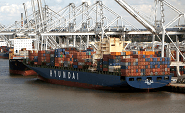Logistics

September 8, 2022
East Coast Port Congestion Worsens
Written by Becca Moczygemba
East coast ports are currently battling crippling congestion, a problem that will likely not wane as we approach peak cargo season.
To avoid west coast congestion, many importers have diverted shipments eastward. Unfortunately, the same challenges followed.
![]()
As excess containers stack up, the port of New York and New Jersey has resolved to implement a container management fee. The charges commenced Sept. 1 and will be levied on containers that remain at the port for an extended amount of time.
The Port Authority of New York and New Jersey reported a 12% increase in seaport cargo over the past year, and a 34% increase compared to the same pre-pandemic period in 2019.
Despite supply chain issues, the port’s container terminals have remained open and accessible to trucks. The port authority noted the fees are part of its continuous efforts to involve all parties in supporting the flow of goods.
“As we continue to manage record cargo volume and work with our tenants and port stakeholders for the removal of empty containers in a timely manner, we call on all industry stakeholders to find sustainable, long-term solutions to an industrywide problem affecting many US ports,” said Kevin O’Toole, Port Authority chairman.
“Our seaport has largely managed to avoid many of the national supply chain challenges affecting other US ports due to our continued collaboration and communication with port partners and stakeholders,” added Rick Cotton, Port Authority executive director. “This new proactive container management approach is an example of our Port Department’s ability to identify and implement solutions before they cause logjams in our region.”
The container imbalance fee will be imposed upon ocean carriers who do not remove empty containers in a timely manner, the Port Authority said.
Fees will be assessed on a quarterly basis, and carriers’ total outgoing container volume must be equal to or over 110% of their total incoming container volume during that period.
Failure to meet these requirements will result in a $100 per container fee. Container volume includes loaded and empty containers but excludes rail volume.
More information on current fees can be found here.
By Becca Moczygemba, Becca@SteelMarketUpdate.com






